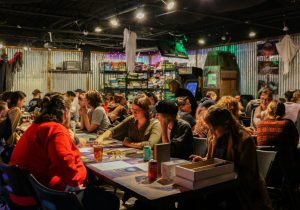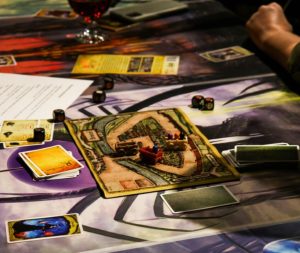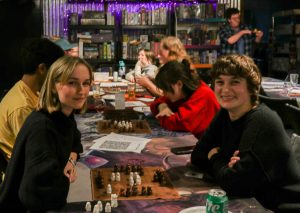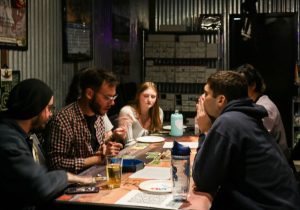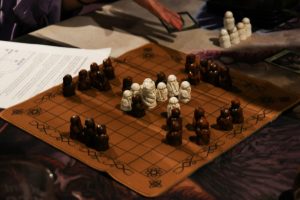This October, the Digital Literacy Communications Lab (DLC) and the Medieval and Early Modern Studies (MEMS) program collaborated to host the first official Medieval Game Night at The Gathering Place. This event featured a brief lecture by Professor Harry Cushman on the importance and prevalence of games in the medieval period followed by a gameplay of games both drawn from the medieval period (such as Viking chess) or inspired by the history of the middle ages (such as Bristol 1350).
In Bristol 1350, a group of inhabitants of the first city to be struck by the Bubonic plague in England race to elbow their way out of the disease-ridden city of Bristol, all the while trying not to become infected with the disease. Prof. Cushman spoke to how Bristol 1350 is a “kind of sobering reminder of the ways that the medieval past is perhaps less alien than we might like to imagine”:
“While part of the fun of this game is to watch with some distant amusement a kind of medieval barbarism as a seemingly a pious friar or a supposedly courteous knight push each other off of apple carts, the game is just as likely to remind someone who plays it in 2023 of the worst human behavior in the early days of our own plague.”
This game also employed the use of dice, a popular instrument of gaming in the medieval period–a tie between contemporary and medieval gameplay:
“Dice were sometimes used for gambling, but also for more casual recreation. Indeed, dice games inspired what we think might be some early role-playing games and accompanying poems, an example of which can be found in the Middle English poem Chaunce of the Dyse, which is a series of fortunes or descriptions of characteristics and prophesied actions that are assigned to different roles of the die. We don’t know for sure whether this particular poem was actually played or if this was just a sort of literary conceit–after all, it falls between Chaucer’s Book of the Duchess and House of Fame–but it is fully playable.”
In speaking to the relationship between the medieval and contemporary gaming culture, Prof. Cushman said:
“The Middle Ages—both the historical realities of the period and the imagined fantasies of this past—have provided ample material for table top, role-playing, and video games in the last half century…Think of the bright, toy-like, vaguely medieval aesthetic and ethos of the Zelda series; or the far harsher, darker world of Dark Souls, a grim landscape of decay in something resembling medieval Europe, but populated by monsters from Japanese mythology. Think of the massive number of video games set in the context of feudal Japan or medieval China: Sekiro, Total War: Three Kingdoms, and Jade Empire to name just a few…This is to say, many video, role-playing, and board games adopt the Middle Ages, or some version of it, as a kind of exotic backdrop–a world that is in many ways foreign and unknown; it is unlike the world we live in, we assume, and so certain imaginative experiments can take place in this other world.”
Prof Cushman added, “it’s useful to think about the Middle Ages and games together [because] people who lived during the period were very interested in and often played games of their own.” One of the games offered during the game night was Neffe-taffel (often called Viking chess), a chess-like game that was likely a variant of a Roman board game:
“Chess and games like it, for instance, originated in the medieval period–in the Seventh Seal, you’ll remember of course that there’s a very famous scene wherein the knight plays chess with the figure of Death. There are references to chess-like games in Middle Persian, Sanskrit, and Arabic texts from the early Middle Ages, and many variants of the game spread throughout Asia, Africa and Europe in later centuries.”
For any undergraduates interested in these topics and those like it, the DOECL offers the MEMS minor! This minor provides students with a broad, humanities-based approach to the rich and fascinating cultures that flourished globally from around 500 CE to 1800 CE. choose from over 150 courses in more than twelve departments to create your own Minor! For more gaming events and courses, please be on the lookout for announcements from the DLC’s Critical Games Studies Program. We look forward to more collaborations in the future!


